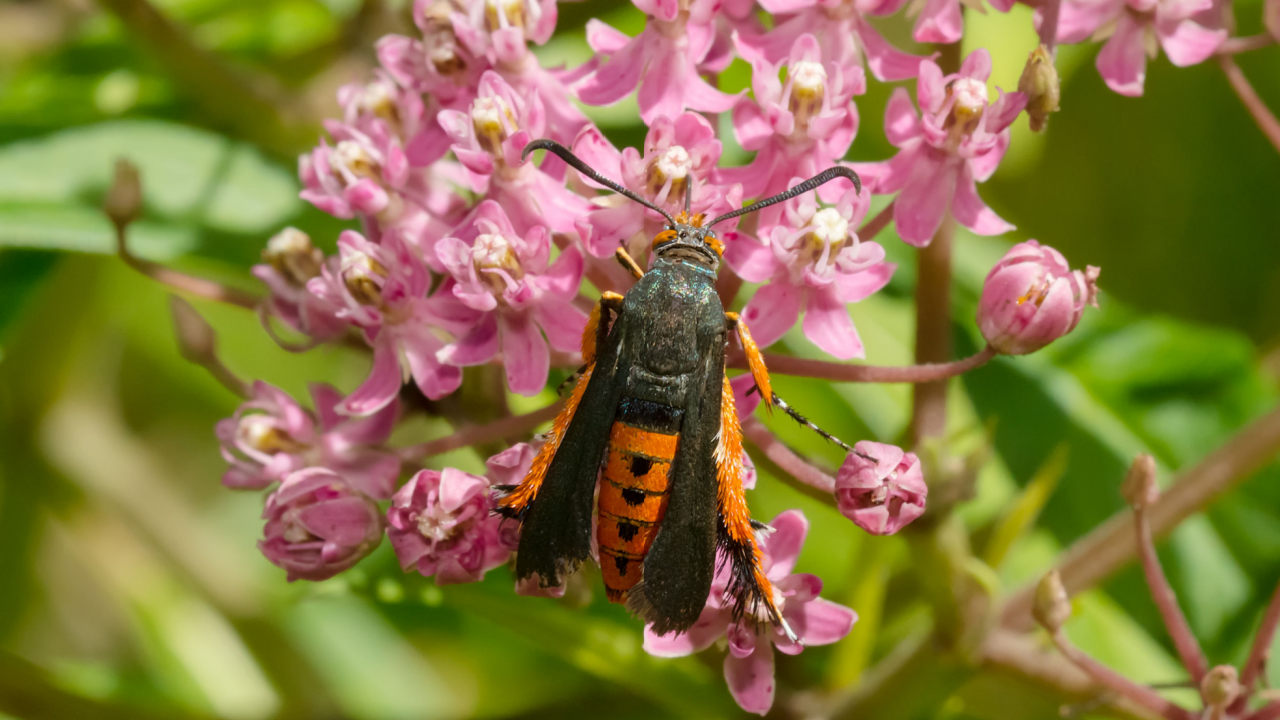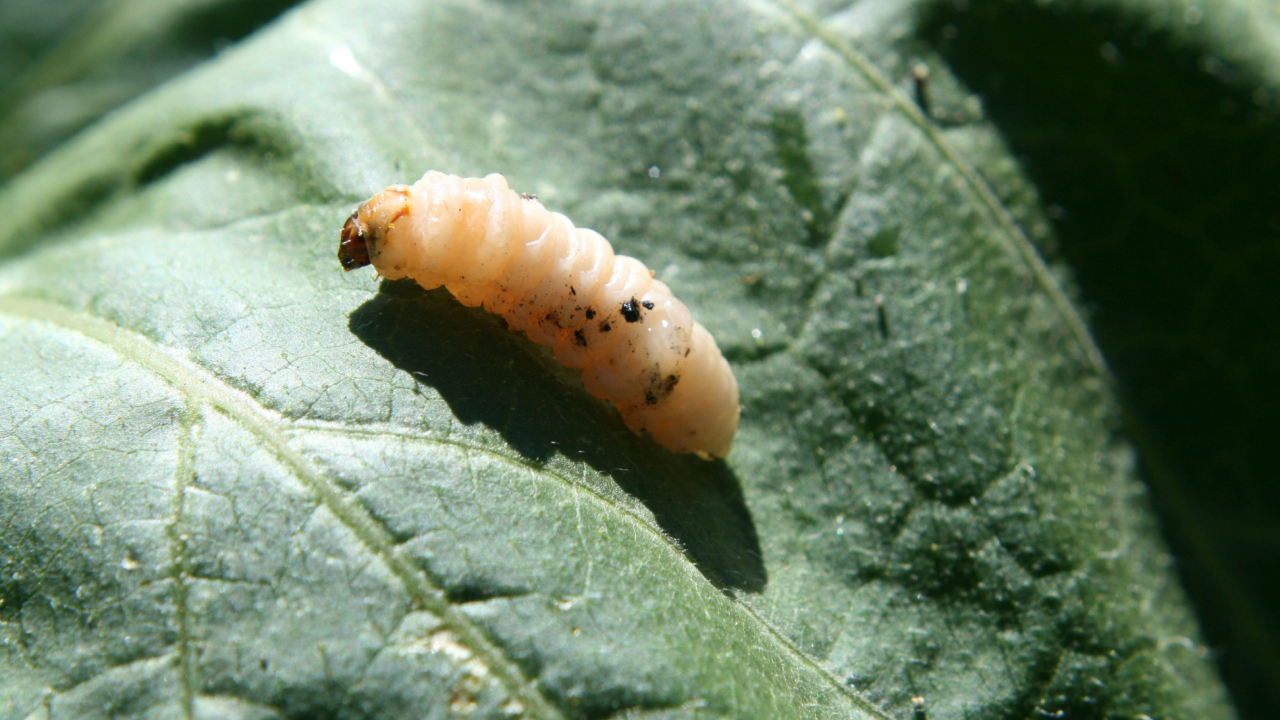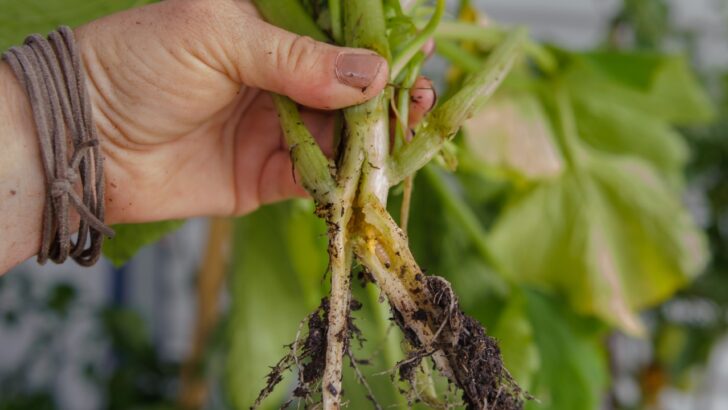There’s nothing more disappointing than going to pick a yummy squash and instead finding your squash plants in distress, destroyed by some unwelcome bug. But don’t worry: we’re looking at ways to prevent. Plus, how to get rid of these nasty little creatures if they’ve already invaded.
See which of these 5 suggestions might make the best natural squash vine borer treatment for your garden!
Squash Vine Borer Symptoms

Image Credit: Shutterstock.
Does this sound familiar? You go to check on the progress of your squash plants, and here’s what you see:
- You notice some leaves are dying, and the plant stems have holes in them.
- It looks like orange-colored sawdust is coming out of the holes.
- Overall, the plants don’t look right. What’s going on?
These are telltale signs that you have a squash vine borer (Melittia cucurbitae) problem.
If you wonder what the adult squash vine borer is, here is what the adult moth looks like.
Using synthetic pesticides can harm your plants. And they may make curious kids and pets sick. Those chemical poisons eventually leak down into the soil.
Many responsible gardeners like you and me turn to a natural squash vine borer treatment instead of chemicals for these reasons. Here are a few pesticide-free solutions to your problem.
Natural Squash Vine Borer Treatments

Image Credit: Shutterstock.
#1 – Cover Stems (with Mulch or Foil)
Cover squash stems with mulch. Wherever the stem wanders, give it a mulch blanket. This makes it hard for the adult vine borer moth to lay eggs on the stems.
Or, you can wrap the bottom of the stem with aluminum foil with the same results.
#2 – Remove Eggs by Hand
Squash vine borer eggs are tiny, round, glossy, and copper-colored. They are usually laid one at a time and placed singularly. Any clusters will be loosely grouped.
Eggs are laid on leaf stems (towards the bottom); if you see groupings of tiny eggs on top of the leaves or on the underside, those are squash bug eggs (here’s how to get rid of squash bugs).
To get rid of the eggs, if you find them in time, drop them into a container of soapy water or squash them.
#3 – Use an Organic Bacterial Spray
Find an organic spray if needed. For example, Safer Brand 5163 Caterpillar Killer II is a natural, organic fix. It is OMRI certified. This means the Organic Materials Review Institute has found it organic according to USDA organic qualifications. It doesn’t harm birds, your soil, earthworms, or beneficial insects.
Spray in the morning or evening, as it dries quickly in the sunshine. This safe, natural product also kills caterpillars, gypsy moth larvae, cabbage loopers, and other garden pests. If you choose some other OMRI-certified product, look for Bacillus thuringiensis (Bt). That is the naturally occurring bacterium that does the job.
#4 – Use Row Covers
A row cover makes the perfect squash vine borer treatment. If momma moth can’t get to your squash, zucchinis, and pumpkins to lay her eggs, she will look elsewhere.
A row cover is a thin, lightweight cloth or fabric that you lay over rows of your plants. Row covers let the sun, air, and water get to your plants, but nothing else.
#5 – Spot Check Squash Leaves
If you see a leaf that is limp, dry, or has a hole at the bottom of the stem, you might have vine borers. If the rest of the plant’s leaves are fine, break the infected leaf off at the base of its stem. Problem solved.
#6 – Plant Butternut Squash and Italian Tromboncinos
Zucchinis and summer squash are the vine borer’s favorites. This little pest doesn’t do nearly as much damage to butternut squash. He just doesn’t find them attractive. Plant butternut squash, and you likely won’t have as many vine borer problems.
The Italian tromboncino summer squash is also highly resistant to this and other critters.
#7 – Use Companion Planting to Keep Pests Off
Grow a few of these companion plants for squash near all of your plants from the squash family to attract pollinators, deter pests, and encourage healthy growth.
Vine borers will attack many of the 965 species of plants in the Cucurbitaceae family, not just squash. Try these squash vine borer treatments if your squash, pumpkin, and zucchini plants are under attack. They can keep your plants healthy and increase your yield. You won’t be using chemicals and pesticides, and that’s a good thing.



8 Best Companion Plants For Squash (And 4 To Avoid)
Sunday 23rd of April 2023
[…] If you’ve ever seen your squash plants inexplicably wilt, only to find, upon closer inspection, that the stems have turned to mush, you know the devastation of squash vine borers. Radishes, it turns out, may be the companion plant your squash needs. These quick-growing little vegetables can help deter squash vine borers. […]
Garden Pests And Diseases - How To Save Your Vegetables, Herbs, And Flowers
Wednesday 17th of August 2022
[…] squash vine borer […]
Backyard Vegetable Garden Ideas
Monday 8th of February 2021
[…] Best Squash Vine Borer Treatment – 5 Chemical-Free Options […]
How To Grow Zucchini (Courgette) And Enjoy It All Summer Long
Friday 4th of September 2020
[…] grows, remove the lower leaves, and wrap the stem in aluminum foil. This keeps the zucchini plant safe from vine borers. You can also wrap it in pantyhose if you prefer […]
5 Simple Steps To Asparagus Beetles Control
Thursday 4th of April 2019
[…] and ladybugs find asparagus beetles delicious! They will also eat squash bugs and other garden predators. A recent Google search for “where to buy lacewings and […]